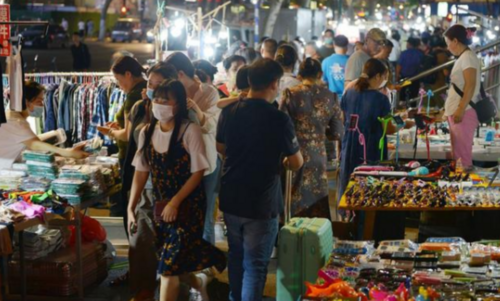Life in Beijing under COVID-19
Life in Beijing under COVID-19

“Please cancel your order because we could not provide accommodation during the International Workers’ Day holiday due to the sudden change in the epidemic prevention policy in Beijing.”
This is the message that I received from my Airbnb host on April 26, 2020. The home is located under the Mutianyu Great Wall, 73 km away from the urban area of Beijing, the place where I should have spent my holiday.
International Workers’ Day is one of the most anticipated holidays of the year for people working or studying in China. Most of them travel during the one-week holiday. The economic consumption brought about by tourism during the holiday earned the week the title of “Golden Week.” However, Golden Week was just five days away when I received the cancellation notice. I tried to book another room, but found that all vacation rentals had been suspended around the Mutianyu Great Wall.
The suspension of vacation-rental business in the suburbs of Beijing is an epidemic prevention measure brought about by the recent local transmission of the virus. An infected person who returned from overseas spread the virus to three of his or her contacts in Chaoyang District, Beijing. It reignited the tension in Beijing, where there had been no local transmission for several days. Therefore, those hotels, homestays, and vacation rentals that had just reopened were forced to suspend their business again. Against this backdrop, it was not difficult to imagine that Beijing would experience a bleak Golden Week.
This is only a portion of Beijing’s efforts to combat COVID-19. More than changing people’s travel plans, every aspect of our lives has been transformed by the outbreak.
Closed Restaurants

When a barbecue restaurant in a hutong (alley) in Beijing that I frequented resumed its business, a friend excitedly invited me to have a meal there, which was the first time for me to eat at a restaurant in two months.
In earlier times, customers had to wait in line for more than an hour, and only then could they enjoy their food at that restaurant. In contrast, only a few diners are scattered inside today. Apparently, most people have not recovered from the fear of the spreading virus. At this juncture, health is obviously more important than food.
“If things go on like this, I won’t be able to even pay the rent. Sooner or later, the restaurant will have to close down,” complained the restaurant owner, looking at his sparse customers.
These are not sensational words. According to public data, in the first two months of 2020, nearly 6 million restaurants and over 13,000 catering enterprises in China closed. COVID-19 also resulted in economic losses of around RMB 500 (70.5 billion USD) to the catering industry just during the seven-day Spring Festival holiday. This is a disaster for people involved in the catering industry—countless jobs vanished due to the outbreak. No one knows how long it will take to recover.
On the way to the restaurant, stores closing down could be seen everywhere, among which were some widely admired restaurants. Diverse restaurant options are a significant source of happiness for those living in Beijing, and for foodies, those business failures only make the situation worse. “I would prefer to line up for an hour every time I eat out,” said my friend staring at those restaurants with closed doors, “than not being able to eat there anymore at all.”
Green Code and Barriers

“Green Code,” officially “Health Kit,” is a contact tracing app developed by the Beijing government. The reason it is called “Green Code” is that a user who has not conducted any high-risk behavior (e.g. visiting epidemic areas, making contact with suspected/confirmed cases, etc.) will get a green QR code in the app; otherwise, they will get a Red Code.
In Beijing, you’d better have a green code, or you’ll find it, metaphorically speaking, hard to move an inch. When you enter your neighborhood, an entrance guard will ask you to show the green code; eating in restaurants, green code; strolling in a park, green code; going to a market for food, green code....
We have to admit that it is a powerful technology for epidemic prevention. It is reasonable to believe that the app makes a crucial contribution to Beijing that effectively controls the outbreak. However, it is not an approach with which everyone feels comfortable.
Since Green Code tracks your movements, if you go to a place outside Beijing, Green Code can, unfortunately, get you into trouble. At the beginning of the outbreak, some people sought help on the social media platform Weibo: As tenants returned to Beijing from their native places after the Spring Festival holiday, several communities refused entry to some, for the app recorded their movements outside Beijing. Even though they had the green code, and the places they went were safe, when they tried to return to the apartments they had rented in Beijing, strict guards of some communities still stopped them.
This is obviously unreasonable discrimination against strangers, which is not supported by the law. But Green Code provides a quicker way for perpetrators to target victims and translate their prejudice into acts. It is hard to imagine how difficult it must have been for those who were kept out of their communities during the raging outbreak. Faced with the threat of the virus, people should have looked out for one another, but instead COVID-19 created a larger barrier between them.
Stay at Home
Then, the media provided 24/7 coverage of the outbreak. Rapidly increasing confirmed cases and the astounding Wuhan lockdown mercilessly curbed people’s passion for Spring Festival celebrations. Visiting relatives, a custom in Spring Festival, became the most improper behavior in those days, a stark departure from the traditional Chinese appreciation for clan relationships and meaningful communication with relatives. Everyone worried that relatives would bring not only care and good wishes, but also the dreadful coronavirus.
“Finally, the moment when I can contribute to society by doing nothing but lying at home has come.” This is a joke popular on social media, which shows Chinese people’s attitude towards the outbreak with good humor. Although Beijing did not implement a stay-at-home order as strict as Wuhan’s, my friends and neighbors voluntarily chose to self-quarantine. After all, when you find that restaurants, parks, and shopping malls are all closed, and that your friends have all agreed not to hang out, you will also become a “good resident,” strictly observing the self-quarantine. To distract myself, I worked hard at cooking during my self-quarantine period, and shared cooking skills and photos with relatives and friends online. The virus is an intangible insulator cutting off the physical connection between people in society, but also linking them in a different manner like an invisible optical fiber.
Live-Streaming and Street Stall Economy

In addition to medical and logistics industries, social media has become important during the pandemic. Contrast to the year of 2019, the daily use time per user on social media platforms increased by 28.6%. People have compensated for the chaos in their lives with social media and live-streaming. Seizing such an opportunity, some merchants have adopted live-streaming platforms as a marketing channel. Using celebrity anchors to market goods is a life-saving straw for merchants trapped in desperate situations. One of the most popular anchors Li Jiaqi could attract over 10 million views during his daily live-streaming program.
In June, when the epidemic became stable, China’s Premier Li Keqiang, during his inspection in Yantai, expressed that the street-stall and small-store economies are important sources of employment.Since the Chinese government plays a decisive role in China’s economic market, Premier Li Keqiang’s positive attitude towards the street-stall economy is a stimulating sign. Consequently, many unemployed people answered the call and became street vendors.
Previously, the government held the opposite attitude towards the street-stall economy. Street stalls, which lead to problems regarding transportation, health and security, were once a key target of the Chinese government. The government defined control over problems caused by street vendors, such as stalls occupying public roads, as a performance assessment factor for local officers. After great efforts were made to deal with street stalls, there are now few street vendors in first-tier cities, and the number of street vendors in second- and third-tier cities is also decreasing. Now, the government’s promotion of the street-stall economy reveals its intention, which is easily understood: Influenced by the epidemic, China’s employment situation is not as good as before. The higher unemployment rate and economic pressures faced by some enterprises have forced the government to consider lifting restrictions on street stalls. This policy may encourage some unemployed people to open street stalls and help street vendors consume the inventory of merchandising businesses.
From January to June, the experience in Beijing under the epidemic demonstrates the truth that change is the only unchangeable rule. Even though the epidemic has been controlled, people here still have to cautiously explore an uncertain future.
